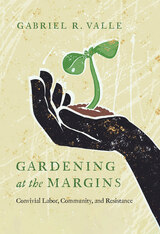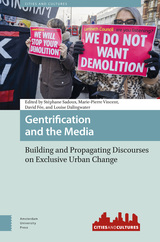5 books about Hoffman, Amy
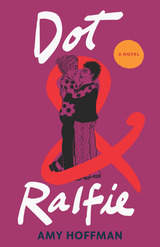
Dot & Ralfie
Amy Hoffman
University of Wisconsin Press, 2022
Dorothy “Dot” Greenbaum and Rafaela “Ralfie” Santopietro have been together for years, but as they age, their stable lives begin to show cracks. Ralfie can’t navigate the stairs in their home after a debilitating knee replacement and Dot’s heart condition throws into question the viability of their careers, their housing, and their relationship. In their late sixties with no kids to lean on, the two women must come to terms with unforeseen questions of identity, love, and family.
Dot is caring but hides hurtful secrets. Ralfie’s gruffness masks the physical and emotional pain she endures. Friends and relatives don’t necessarily offer appealing role models for their third act. Dot’s sister Susan is pushing them toward a stuffy “55 or better” community out in the ’burbs, populated by aging straights who mistake the butch Ralfie for a frumpy old man. Eighty-year-old Viola—Dot’s friend and sometime lover—lives alone and refuses help, even as she experiences a devastating fall. Rife with Hoffman’s characteristic wit, Dot & Ralfie takes a hard, sometimes painful look at elder care in the LGBTQ+ community, and the unique struggles that come with getting older outside of heteronormative structures.
Dot is caring but hides hurtful secrets. Ralfie’s gruffness masks the physical and emotional pain she endures. Friends and relatives don’t necessarily offer appealing role models for their third act. Dot’s sister Susan is pushing them toward a stuffy “55 or better” community out in the ’burbs, populated by aging straights who mistake the butch Ralfie for a frumpy old man. Eighty-year-old Viola—Dot’s friend and sometime lover—lives alone and refuses help, even as she experiences a devastating fall. Rife with Hoffman’s characteristic wit, Dot & Ralfie takes a hard, sometimes painful look at elder care in the LGBTQ+ community, and the unique struggles that come with getting older outside of heteronormative structures.
[more]

The Dream of a Common Movement
Selected Writings of Urvashi Vaid
Urvashi Vaid. Edited by Jyotsna Vaid and Amy Hoffman
Duke University Press, 2025
The Dream of a Common Movement collects essays, interviews, and speeches by the late feminist and civil rights activist Urvashi Vaid, whose pioneering writing and organizing over the course of four decades fundamentally shaped the LGBTQ+ movement. Vaid explores the LGBTQ+ movement’s impact on the AIDS epidemic and its challenges as it developed a national presence. She calls out movement leaders and donors for not addressing gender, race, and class issues and passionately argues that the goal of any liberation movement should be transformation, not assimilation. In personal essays, Vaid describes a double consciousness forged by the experience of immigration and a complicated relationship with her Indian-American and lesbian identities. Whether she was focused on the Donors of Color Network, the 22nd Century Initiative, the Lesbian Political Action Committee, or other initiatives she launched, Vaid was steadfast in her vision of a more just society and believed deeply in the power of people coming together to effect change. Offering a window into the breadth of her progressive vision for social change, this volume inspires readers to never stop organizing and marching.
[more]
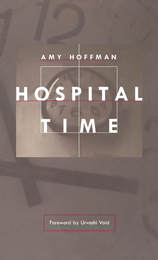
Hospital Time
Amy Hoffman
Duke University Press, 1997
Hospital Time is a memoir about friendship, family, and caregiving in the age of AIDS. Amy Hoffman, a writer, lesbian activist, and former editor of Gay Community News, chronicles with fury and unflinching honesty her experience serving as primary caretaker for her friend and colleague, Mike Riegle, who died from AIDS-related complications in 1992. Hoffman neither idealizes nor deifies Riegle, whom she portrays as a brilliant man, devoted prison rights activist, and very difficult friend.
Hoffman became central to Riegle’s caregiving when he asked her to be his health-care proxy, and although she willingly chose to do this, she explores her conflicting feelings about herself in this role and about her involvement with Riegle and his grueling struggle with hospitalization, illness, and, finally, death. She tells of the waves of grief that echoed throughout her life, awakening memories of other losses, entering her dreams and fantasies, and altering her relationships with friends, family, and even total strangers.
Hoffman’s memoir gives voice to the psychological and emotional havoc AIDS creates for those in the difficult role of caring for the terminally ill and it gives recognition to the role that lesbians continue to play in the AIDS emergency. A foreword by Urvashi Vaid, former executive director of the National Gay and Lesbian Task Force, offers a meditation on the politics of AIDS and the role of family in the lives of lesbians and gay men.
Hoffman became central to Riegle’s caregiving when he asked her to be his health-care proxy, and although she willingly chose to do this, she explores her conflicting feelings about herself in this role and about her involvement with Riegle and his grueling struggle with hospitalization, illness, and, finally, death. She tells of the waves of grief that echoed throughout her life, awakening memories of other losses, entering her dreams and fantasies, and altering her relationships with friends, family, and even total strangers.
Hoffman’s memoir gives voice to the psychological and emotional havoc AIDS creates for those in the difficult role of caring for the terminally ill and it gives recognition to the role that lesbians continue to play in the AIDS emergency. A foreword by Urvashi Vaid, former executive director of the National Gay and Lesbian Task Force, offers a meditation on the politics of AIDS and the role of family in the lives of lesbians and gay men.
[more]
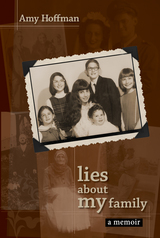
Lies About My Family
A Memoir
Amy Hoffman
University of Massachusetts Press, 2013
This well-crafted family memoir is about the stories that are told and the ones that are not told, and about the ways the meanings of the stories change down the generations. It is about memory and the spaces between memories, and about alienation and reconciliation.
All of Amy Hoffman's grandparents came to the United States during the early twentieth century from areas in Poland and Russia that are now Belarus and Ukraine. Like millions of immigrants, they left their homes because of hopeless poverty, looking for better lives or at the least a chance of survival. Because of the luck, hard work, and resourcefulness of the earlier generations, Hoffman and her five siblings grew up in a middle-class home, healthy, well fed, and well educated. An American success story? Not quite—or at least not quite the standard version. Hoffman's research in the Ellis Island archives along with interviews with family members reveal that the real lives of these relatives were far more complicated and interesting than their documents might suggest.
Hoffman and her siblings grew up as observant Jews in a heavily Catholic New Jersey suburb, as political progressives in a town full of Republicans, as readers in a school full of football players and their fans.
As a young lesbian, she distanced herself from her parents, who didn't understand her choice, and from the Jewish community, with its organization around family and unquestioning Zionism. However, both she and her parents changed and evolved, and by the end of this engaging narrative, they have come to new understandings, of themselves and one another.
All of Amy Hoffman's grandparents came to the United States during the early twentieth century from areas in Poland and Russia that are now Belarus and Ukraine. Like millions of immigrants, they left their homes because of hopeless poverty, looking for better lives or at the least a chance of survival. Because of the luck, hard work, and resourcefulness of the earlier generations, Hoffman and her five siblings grew up in a middle-class home, healthy, well fed, and well educated. An American success story? Not quite—or at least not quite the standard version. Hoffman's research in the Ellis Island archives along with interviews with family members reveal that the real lives of these relatives were far more complicated and interesting than their documents might suggest.
Hoffman and her siblings grew up as observant Jews in a heavily Catholic New Jersey suburb, as political progressives in a town full of Republicans, as readers in a school full of football players and their fans.
As a young lesbian, she distanced herself from her parents, who didn't understand her choice, and from the Jewish community, with its organization around family and unquestioning Zionism. However, both she and her parents changed and evolved, and by the end of this engaging narrative, they have come to new understandings, of themselves and one another.
[more]
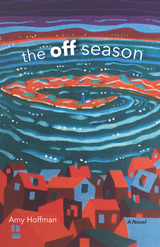
The Off Season
Amy Hoffman
University of Wisconsin Press, 2019
When Nora Griffin, an artist in her midthirties, moves from Brooklyn to Provincetown, she isn't looking for trouble. Her partner, Janelle, is recovering from breast cancer treatment, and together they've decided that the quiet off-season on the tip of Cape Cod is the perfect place for Janelle to heal and Nora to paint. Then charismatic Baby Harris flirts into Nora's life in her red cowboy boots.
In the damp, windy winter, Nora contends with heartbreak, aging, and local environmental worries, while painting what she hopes will be her masterpiece. Along the way, she encounters the chain-smoking, motor scooter–driving landlady Miss Ruby; Reverend Patsy, the vegan minister of the Unitarian church; and Brunhilde, barista extraordinaire and rival for Baby's affections. As the first tourists begin to arrive in June, Nora must decide what she really wants from life.
In the damp, windy winter, Nora contends with heartbreak, aging, and local environmental worries, while painting what she hopes will be her masterpiece. Along the way, she encounters the chain-smoking, motor scooter–driving landlady Miss Ruby; Reverend Patsy, the vegan minister of the Unitarian church; and Brunhilde, barista extraordinaire and rival for Baby's affections. As the first tourists begin to arrive in June, Nora must decide what she really wants from life.
[more]
READERS
Browse our collection.
PUBLISHERS
See BiblioVault's publisher services.
STUDENT SERVICES
Files for college accessibility offices.
UChicago Accessibility Resources
home | accessibility | search | about | contact us
BiblioVault ® 2001 - 2025
The University of Chicago Press




